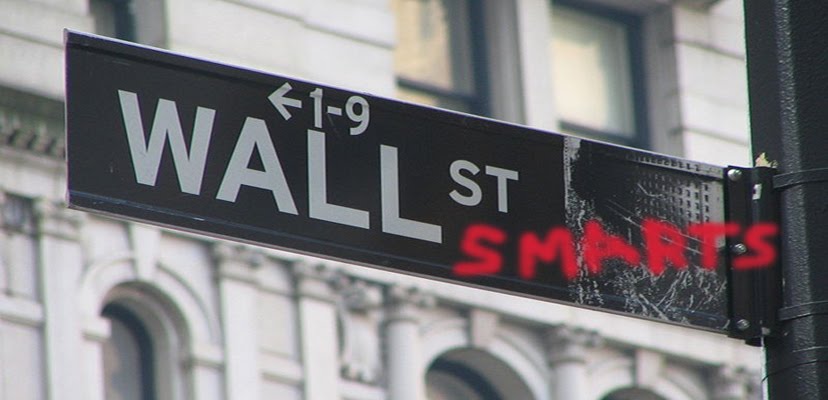WALL STREET SMARTS, THE BLOG, IS NOW WALL STREET SMARTS, THE BOOK. FULLY EDITED AND REVISED WITH NEW MATERIAL ON AMAZON
Mr. Mamis has more to offer us in his book, The Nature of Risk, Stock Market Survival and the Meaning of Life. In the last post about his book, we ended with the observation that there is never a time in the stock market when the "right" decision is perfectly clear. Let's continue with the book:
Mr. Mamis has more to offer us in his book, The Nature of Risk, Stock Market Survival and the Meaning of Life. In the last post about his book, we ended with the observation that there is never a time in the stock market when the "right" decision is perfectly clear. Let's continue with the book:
A useful simile for the stock market might be that of the tide, waves and a beach. The tide comes in and goes out in cyclical fashion; the waves come in and go out like market fluctuations, but in differing fashions - crashing, gentle, white-capped, mild. Each wave, each tide, affects the grains of sand on the beach, shifting them here and there; there may be a period of erosion, a period of rebuilding, but in a different place. Those shifting grains of sand make up the (long term) beach, just as constantly shifting but minute changes in price, tick by tick, make up the stock market. A sudden violent (short term) storm can rip the beach up and change its shape, and even though we were warned by the weatherman, he did forecast such a "storm in the late afternoon," so we thought we could enjoy a picnic lunch first. And yet the weatherman was not wrong: he may have underestimated the severity, may have missed the precise timing, but there was the warning for us to believe or not. Hindsight reminds us of how much we know, and yet still we got drenched in the parking lot.
Thus it is not just information that becomes the key to taking a market risk; it is also necessary to understand such information in terms of our relationship to that knowledge. "What do we know?" "How do we know it?" and "What is our reaction to that information?" - as well as "What do we need/wish/want to know?" - are all questions that affect the decisions we make every day. Some of that is trivial, routine, habit. We "decide" what clothes to wear to work and in what sequence to put the garments on, but never pause to wonder if that routine might be best for us. And thus we might panic in preparing for a job interview because the getting-dressed risk of what had been easy to "decide" abruptly increases. What is a suitable interview suit? How do we want to present ourselves? The anxiety of making a mistake overpowers the ability to make a "free" choice. When a decision is required, the way we take information in, and how we use it, affects that decision. Our self's style goes back deep into childhood. The manner in which we let information in, our ability to understand it, to deal with it, and perhaps even distort it, all start with who we are, as developed from the moment of beginning, on our hands and knees, to explore the world.
Thus the risk we are about to take via our next decision is not a simple choice of "do it or not" or "yes or no." Before deciding, we need to know why what we know is never enough, a question that, in turn, leads to what kind of information do we believe or trust? and is it us or the market? But we must remember that there are times when the market, or life itself, is incoherent, unclear, and/or conflicting: times when it isn't us, it's it. The risk can never be cured by knowing enough.
But when information is insufficient we need the trust and belief in ourselves, and the inner acceptance that we'll be okay anyhow. We need the discipline to accept whatever is available. We need the experience to understand all the ifs, ands, and buts, and yet still confront the risk and make the decision. Setting ourselves free from the quest for information, oddly enough, is what reduces risk even as it appears from the freedom itself that risk is being scarily increased. Oh my, freedom; that's dangerous.
Both Dr. Le Bon and Mr. Mamis use the analogy of grains of sand. Wind blows the sand around on the beach like Dr. Le Bon's individuals in a crowd. Waves move the sand to remake the beach like the market for Mr. Mamis. Given all of the subconscious forces Mr. Mamis says are at work in each of us as we approach risk and decisions, it would appear that we each, at times, may act like Dr. Le Bon's psychological crowd; although a crowd of only one.
If you would like to leave a comment, you can do so without signing into the site. Click the comments link, leave your comment and pick the "Anonymous" profile. Feel free to add your name at the end of your comment. Comments are posted within 24 hours of receipt.
Excerpts from The Nature of Risk, Stock Market Survival and the Meaning of Life by Justin Mamis, copyright 1991, are used with the permission of Mr. Mamis and Fraser Publishing Company.

No comments:
Post a Comment